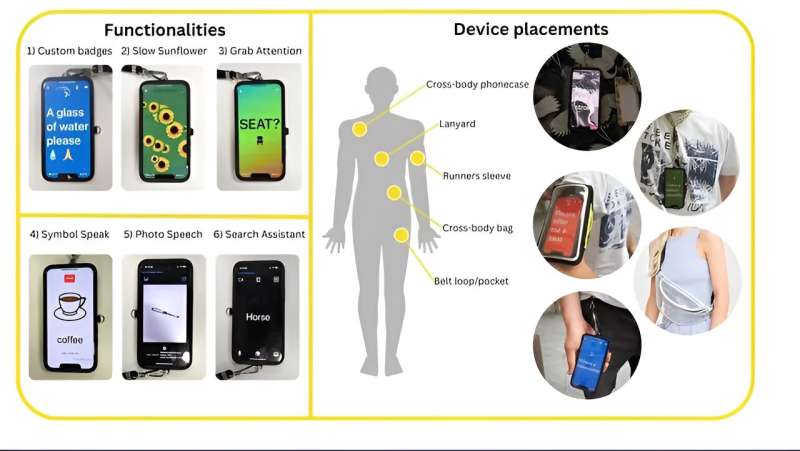Scientists have developed an affordable and customizable digital badges to help those with aphasia navigate public transport and everyday life without stigma.
Inspired by the Hidden Disabilities Sunflower lanyard, Dr. Timothy Neate and Humphrey Curtis from King’s College London worked with local patient groups and charity Aphasia Re-connect to design InkTalker and WalkieTalkie, discreet and wearable electronic badges that act as a conversation aids for people living with complex communication needs (CCNs).
InkTalker displays a series of pre-loaded phrases for conversational use, while WalkieTalkie presents an easy-to-use platform displaying customizable text.
CCNs refer to a broad range of impairments that can result in difficulties speaking, reading and writing, making everyday conversations with strangers and social navigation more challenging. These can be caused conditions such as dementia or aphasia, a language impairment often caused by stroke, and have been shown to lead to increased risk of depression, psychological stress and poor quality of life.
There are however tools to help people living with aphasia “communicate in the moment.” People with aphasia often carry objects which display information about their needs, such as TfL’s “Please Offer Me a Seat” badges, or cards which say, “I have had a stroke” and provide further information about how to communicate.
They might also use “high tech” augmentative and alternative communication (AAC) devices like Stephen Hawking’s voice communication system to produce speech. These typically take the form of tablet applications that read in put text aloud.
However, these traditional tablet devices are often abandoned as they tend to attract stigma because of their visibility and can block non-verbal communication like body language. Low-tech solutions like TfL’s badge, while less visible, can also result in stigma as they fail to add context to onlookers’ pre-conceived ideas of who should be offered a seat and can only be used in limited situations

By offering a new, discreet, and customizable form of communication, this new prototype hopes to avoid the stigma associated with bulkier devices while presenting a flexible aid that people living with aphasia can dynamically change to suit their situation. By providing a visible solution that users can wear, the device also helps lay clear expectations of disability during conversations with strangers.
Dr. Neate, Lecturer in Computer Science at King’s College London and principal investigator of the study said, “Aphasia is an invisible disability that, while disruptive to people’s lives, doesn’t enjoy much public awareness. This can mean that people living with it can face stigma when trying to use the very devices that have been made to help them communicate.
“With InkTalker and WalkieTalkie, you could just as easily ask someone ‘can you help me write this down’ when asking for a phone number, or ‘can you help me get to Tottenham Court Road’ if you lose your way in the city—empowering those who may traditionally find it difficult to speak up and react to life’s dynamic needs. Designing AAC devices alongside people living with CCNs is vital for ensuring these technologies achieve that goal.”
Annette Cmela, CMO Hidden Disabilities Sunflower said, “This innovation represents a significant step forward in enhancing the daily lives of individuals with complex communication needs. By offering a discreet and customizable solution, it aligns perfectly with our goal at Hidden Disabilities Sunflower to increase awareness and understanding of invisible disabilities. We’re excited to see how this technology can empower those with aphasia and similar conditions, allowing them to navigate public spaces with greater ease and confidence.”
In the future, the team hope to develop interactive displays in public transportation to help remove communication barriers for people with aphasia on the estimated 1.35 billion annual passenger journeys on the London Underground.
Citation:
Specialized badges help people with invisible disabilities speak up (2024, August 5)
retrieved 5 August 2024
from https://medicalxpress.com/news/2024-08-specialized-badges-people-invisible-disabilities.html
This document is subject to copyright. Apart from any fair dealing for the purpose of private study or research, no
part may be reproduced without the written permission. The content is provided for information purposes only.

